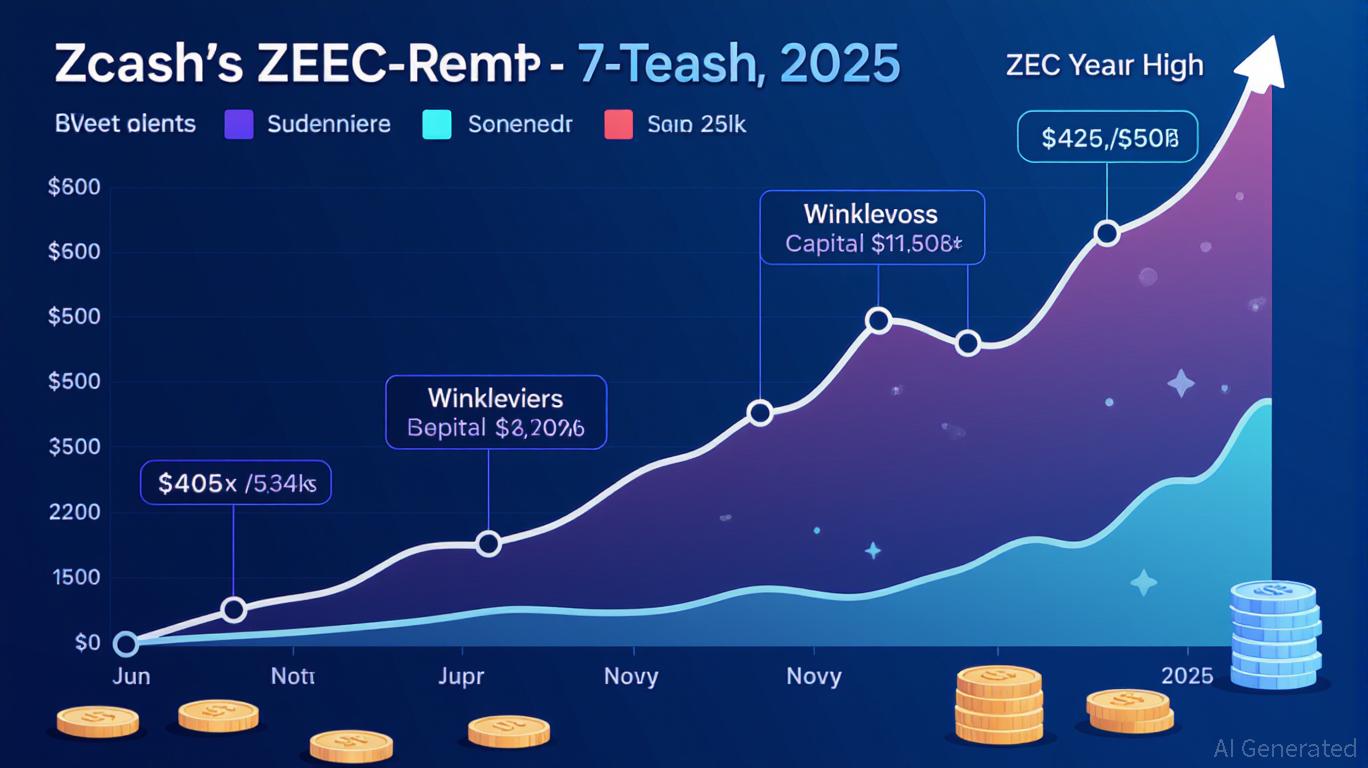Zcash (ZEC) Price Soars: Blockchain Privacy Innovations and Growing Institutional Interest Usher in a New Chapter for Privacy-Focused Cryptocurrencies
- Zcash (ZEC) surged 472% to $420 in late 2025, driven by institutional adoption and blockchain privacy innovations. - Grayscale and Winklevoss Capital allocated $195.88M to ZEC, leveraging its hybrid privacy-transparency model for AML-compliant private transactions. - Zcash's optional transparency technology saw 30% of supply in shielded pools, with zenZEC token bridging privacy and DeFi liquidity. - 2025 U.S. Clarity/Genius Acts provided regulatory clarity, enabling privacy coins to operate within compli
Institutional Adoption: Driving ZEC’s Growth
The recent rally in Zcash’s value is largely driven by a surge in institutional investment. Grayscale, a prominent crypto asset manager, invested $137 million in ZEC via its Zcash Trust (ZCSH), leveraging the coin’s blend of privacy and openness.
Institutional enthusiasm was further boosted when Winklevoss Capital spearheaded a $58.88 million private investment round in October 2025,
Blockchain Privacy Breakthroughs: ZEC’s Core Strength
Technological progress has played a crucial role in Zcash’s comeback. Its optional transparency feature, enabling users to choose between shielded (private) and open transactions, has pushed on-chain activity to unprecedented levels.
Innovations such as Zenrock’s wrapped ZEC token (zenZEC) have broadened Zcash’s practical uses.

Regulatory Developments: Boosting Privacy Coins
The introduction of the U.S. Clarity Act and Genius Act in 2025 has established a regulatory foundation for privacy coins like Zcash.
Conclusion: Redefining Privacy-Driven Digital Assets
The surge in Zcash’s price reflects the increasing importance of privacy for both large-scale and individual investors. With the support of major institutions, ongoing technical innovation, and favorable regulatory changes, ZEC has moved beyond its niche status to become a leading privacy coin. As financial monitoring becomes more pervasive, Zcash’s ability to offer both compliance and confidentiality may secure its place as a reliable safeguard against systemic threats.
Disclaimer: The content of this article solely reflects the author's opinion and does not represent the platform in any capacity. This article is not intended to serve as a reference for making investment decisions.
You may also like
Bitcoin Updates: Corporate Bitcoin Holdings Transform Crypto Industry While MicroStrategy Stands Strong Amid Market Fluctuations
- MicroStrategy's Michael Saylor denied Bitcoin sale rumors, reaffirming the company's aggressive BTC accumulation strategy despite market volatility. - The firm holds 641,692 BTC ($61.3B) but faces liquidity risks as its market value dips below holdings' net asset value for the first time. - Leveraged debt ($47.5B) and falling BTC prices raise concerns about a "death spiral," though analysts suggest forced sales are unlikely until 2027. - Saylor's bullish stance contrasts with market jitters, as corporate

Bitcoin Updates: Harvard’s Investment in Bitcoin Challenges Previous Doubts as More Institutions Join
- Harvard University tripled its Bitcoin stake in IBIT, now holding $442.8M in the ETF, making it the fund's 16th-largest holder. - The move defies past skepticism from Harvard economists like Kenneth Rogoff, who once predicted Bitcoin would fall to "$100 rather than $100,000". - Institutional adoption grows as Abu Dhabi's Al Warda and Emory University also boosted Bitcoin ETF holdings, despite recent market volatility and outflows. - Harvard's 0.6% Bitcoin allocation in its $57B portfolio highlights crypt

Bitcoin Updates: Bitcoin Drops, Harvard's $364 Million ETF Investment Shows Institutional Commitment
- Harvard University increased its BlackRock IBIT Bitcoin ETF stake by 257% to $364.4M, becoming a top institutional holder. - The $50B endowment also doubled gold ETF holdings, treating both assets as inflation hedges amid macroeconomic uncertainty. - Emory and Abu Dhabi's Al Warda similarly boosted crypto-linked ETFs, signaling institutional confidence in regulated digital assets. - Analysts highlight Harvard's ETF adoption as rare validation, with U.S. spot Bitcoin ETFs attracting $60.8B in inflows sinc

Astar 2.0's Tactical Rollout and Its Impact on DeFi Advancements
- Astar 2.0 introduces institutional-grade DeFi architecture with 6-second block times and 150,000 TPS via Polkadot's async protocol. - Cross-chain interoperability with LayerZero/CCIP enables seamless asset transfers across Ethereum , BSC, and Polkadot ecosystems. - Strategic partnerships with Mizuho Bank, Casio, and Japan Airlines demonstrate real-world applications in CBDCs, logistics, and digital rewards. - $3.16M institutional ASTR purchase and 20% QoQ wallet growth highlight growing confidence in its
